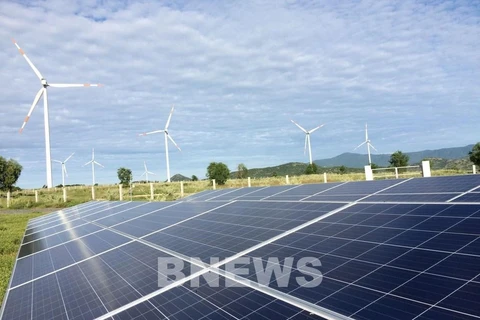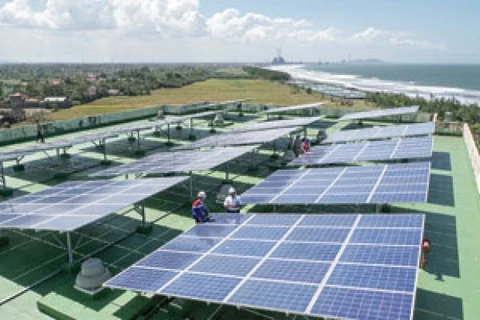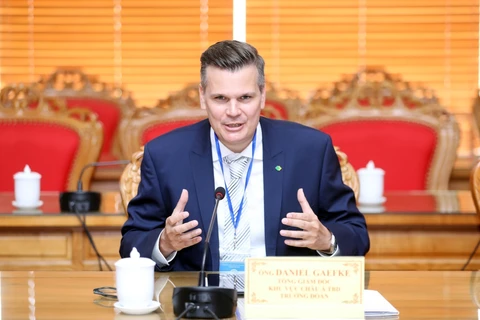Hanoi (VNA)- At the webinar "Asia: The Renewable Energy Continent" taking place on June 16, Tang The Cuong - Director of the Department of Climate Change at the Ministry of Natural Resources and Environment, emphasized that together with the process of economic model transition from "brown" to "green", energy transition is playing a key role in helping achieve sustainable development goals, realizing the country’s goal of achieving net emissions of "zero" in 2050.
Therefore, in order to promote the potential of renewable energy as well as promoting energy transition from fossil to renewable energy, the Ministry of Natural Resources and Environment has introduced seven proposals for developing sustainable and green energy.
First, the Ministry of Natural Resources and Environment believes that renewable energy needs to become a public good, serving all people and everyone can access and benefit from renewable energy. Groups or communities which are affected by the energy transition need to be supported in terms of livelihood, re-trained to change careers.
Second, countries should promote cooperation in removing barriers, including barriers to intellectual property rights, in order to enhance knowledge sharing; promote cooperation in scientific research, development and transfer of renewable energy technologies from developed countries to developing ones.
Third, policy has an important role in promoting the energy transition. Therefore, countries need to have appropriate mechanisms and policies to encourage business community to increase investment in renewable energy as well as promoting energy transformation; especially from planning, licensing, management and operation of renewable energy development projects.
Fourth, countries need to set targets on renewable energy development, achieving net zero emissions and reducing air pollution as criteria for making investment decisions, developing energy projects; adjusting investment loan portfolio towards accelerating transition to renewable energy.
Fifth, countries increase investment in power transmission systems to maximize benefits of wind and solar energy production; invest in necessary infrastructure development to accelerate the application of clean technologies such as electric vehicles, electric cars and electric motorbikes.
Sixth, in addition to efforts to promote energy transition and develop potential of renewable energy, countries need to synchronously deploy other solutions such as restoring natural ecosystems that are resilient to climate change to enhance carbon storage capacity; promoting a circular economy in order to make the most efficient use of resources while conserving resources for future generations.
Finally, in order to promote the development of renewable energy and make renewable energy to commensurate with the potential of the continent, it is necessary to have participation of news agencies and press in the region to contribute to spreading the message of urgency of energy conversion, helping business community and citizens better understand the economic, environmental and social benefits brought by renewable energy development.
Appreciating the Vietnamese government in reducing carbon emissions, Hideki Minamikawa, Director of the Japan Environmental Sanitation Center and Director of RENOVA Company (former Deputy Minister of Environment of Japan) emphasized the efforts of the government to address climate change has received praise from the international community.
According to Hideki Minamikawa, at present, countries can consider renewable energy development models through peer-to-peer exchange between households in European countries
“The development of renewable energy requires good regulations. It is important to organize a renewable energy trading ecosystem," noted the expert of the Japan Environmental Sanitation Center.
Vietnam is one of the most efficient power markets in Southeast Asia, driven by low-cost resources such as hydro and coal. The country has achieved around 99 percent electrification with relatively low cost in comparison to neighboring countries.
With electricity demand projected to increase by eight percent annually until 2025, the government is moving forward to develop renewable energy sources to ensure energy security and addressing the growing power demand./.























